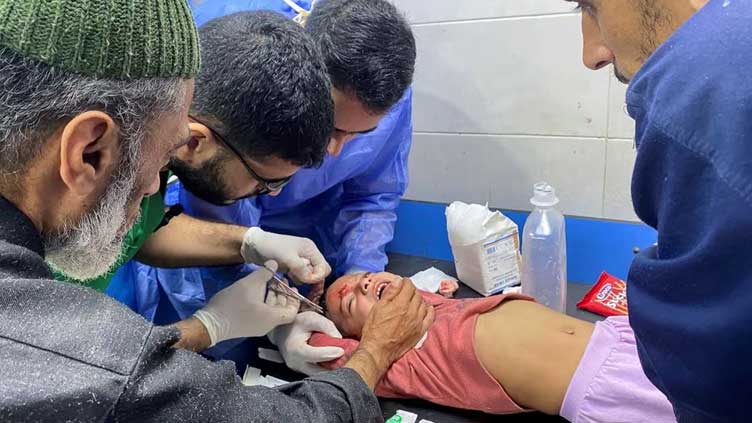The little girl was weeping in pain and screaming “Mummy, Mummy” while the nurse stitched up her head wound without using any anaesthetic, because none was available at the time at Al Shifa Hospital in Gaza City.
That was one of the worst moments nurse Abu Emad Hassanein could recall as he described the struggle to deal with an unprecedented influx of wounded people and a dearth of pain relief medication since the war in Gaza started a month ago. “Sometimes we give some of them sterile gauze (to bite on) to reduce the pain,” said Hassanein.
“We know that the pain they feel is more than someone would imagine, beyond what someone their age would stand,” he said, referring to children like the girl with the head wound.
Arriving at Al Shifa to have the dressing changed and disinfectant applied to a wound on his back caused by an air strike, Nemer Abu Thair, a middle-aged man, said that he was given no pain relief when the wound was originally stitched up. “I kept reciting the Koran until they finished,” he said.
The war started on Oct. 7 when Hamas gunmen burst through the Gaza Strip’s border fence with southern Israel. Israel says Hamas killed 1,400 people and abducted 240, in the worst day of carnage in Israel’s history.
Israel responded with an air, sea and ground assault on the densely populated, Hamas-controlled enclave, which health officials in Gaza say has killed more than 10,800 Palestinians.
Mohammad Abu Selmeyah, the director of Al Shifa Hospital, said that when very large numbers of injured people have been brought in at the same time, there has been no choice but to deal with them on the floor, without adequate pain relief.
He gave as an example the immediate aftermath of an explosion at the Al Ahli Arab Hospital on Oct. 17, when he said some 250 injured people arrived at Al Shifa, which has only 12 operating theatres.
“If we had waited to operate on them one by one, we would have lost many of the wounded,” said Abu Selmeyah.
“We were forced to operate on the ground and without anaesthesia, or using simple anaesthesia or weak pain killers to save lives,” he said.
Procedures that have been performed by staff at Al Shifa under such circumstances have included amputating limbs and fingers, stitching up serious wounds, and treating serious burns, said Abu Selmeyah, without elaborating.
PAIN OR DEATH
“It is painful for the medical team. It is not simple. It is either the patient suffers pain or loses his life,” he said.
Israel said the blast at the Al Ahli Arab Hospital was caused by a failed rocket launch by the Palestinian Islamic Jihad militant group. Palestinian Islamic Jihad and Hamas blamed an Israeli air strike.
Israel’s ally the United States said its own intelligence assessment supported Israel’s explanation.
At Nasser Hospital in Khan Younis, in the south of the Gaza Strip, director Dr Mohammad Zaqout said there had been a period early on in the war when anaesthetic supplies ran out completely, until aid trucks were allowed in.
“Some procedures were carried out without anaesthesia, including Caesarian sections on women, and we were also forced to operate on some burns that way too,” said Zaqout. He said that staff did their best to alleviate patients’ pain with other, weaker medications, but this was inadequate.
“This is not the ideal solution for a patient inside an operating theatre, who we want to operate on with full anaesthesia,” he said. For the first 12 days of the war, no aid was allowed into Gaza. On Oct. 21, a first convoy of aid trucks came in through the Rafah Crossing on the strip’s border with Egypt.
Since then, several convoys have entered, but the United Nations and international aid groups say the aid provided is nowhere near the scale needed to mitigate a humanitarian catastrophe.
Zaqout added that while the shortage of anaesthesia had been eased at his own hospital thanks to aid deliveries, there were still severe shortages at Al Shifa and at the Indonesian Hospital, both of which are in the heavily bombarded north of the strip.
Post Views: 51


 Sports3 months ago
Sports3 months ago
 Fashion2 months ago
Fashion2 months ago
 Sports3 months ago
Sports3 months ago
 pakistan3 months ago
pakistan3 months ago
 pakistan3 months ago
pakistan3 months ago
 World2 months ago
World2 months ago
 World3 months ago
World3 months ago
 Sports2 months ago
Sports2 months ago























